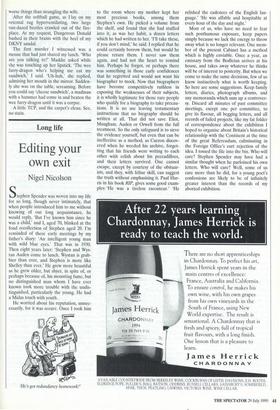Long life
Editing your own exit
Nigel Nicolson
Stephen Spender was woven into my life for so long, though never intimately, that when people introduced him to me without knowing of our long acquaintance, he would reply, 'But I've known him since he was a child,' and I, aged 70, blinked at the fond recollection of Stephen aged 20. I'm reminded of these early meetings by my father's diary: 'An intelligent young man with wild blue eyes.' That was in 1930. Then eight years later: 'Stephen and Wys- tan Auden come to lunch. Wystan is grub- bier than ever, and Stephen is more like Shelley than ever.' He grew more beautiful as he grew older, but shyer, in spite of, or perhaps because of, his mounting fame, but no distinguished man whom I have ever known took more trouble with the undis- tinguished, particularly the young. He had a Midas touch with youth.
He worried about his reputation, unnec- essarily, for it was secure. Once I took him
`He's got redundancy homework!'
to the room where my mother kept her most precious books, among them Stephen's own. He picked a volume from the shelf, and found that she had stuffed into it, as was her habit, a dozen letters which he had written to her. 'I'll take these, if you don't mind,' he said. I replied that he could certainly borrow them, but would he please return them. I never saw them again, and had not the heart to remind him. Perhaps he forgot, or perhaps there was something in those early confidences that he regretted and would not want his biographer to mock. Now that biographers have become competitively ruthless in exposing the weaknesses of their subjects, it is wholly legitimate for those rare people who qualify for a biography to take precau- tions. It is no use leaving testamentary instructions that no biography should be written at all. That did not save Eliot, Maugham, Auden or Orwell from the full treatment. So the only safeguard is to sieve the evidence yourself, but even that can be ineffective as a method, as Curzon discov- ered when he weeded his archive, forget- ting that his friends were writing to each other with relish about his peccadilloes, and their letters survived. One cannot escape, except by courtesy of the obituar- ists, and they, with feline skill, can suggest the truth without emphasising it. Paul Har- ris in his book RIP, gives some good exam- ples: 'He was a tireless raconteur.' He relished the cadences of the English lan- guage.' He was affable and hospitable at every hour of the day and night.'
Most of us, who have no need to fear such posthumous exposure, keep papers simply because we lack the energy to throw away what is no longer relevant. One mem- ber of the present Cabinet has a method which is highly enviable. Once a year, an emissary from the Bodleian arrives at his house, and takes away whatever he thinks will be of interest to posterity. But when we come to make the same decisions, few of us know instinctively what is worth keeping. So here are some suggestions. Keep family letters, diaries, photograph albums, and any memoranda which sum up a controver- sy. Discard all minutes of past committee meetings, except one per committee, to give its flavour, all begging letters, and all records of failed projects, like my fat folder of correspondence about the exhibition I hoped to organise about Britain's historical relationship with the Continent at the time of the great Referendum, culminating in the Foreign Office's curt rejection of the idea. I tossed the file into the bin. Who will care? Stephen Spender may have had a similar thought when he purloined his own letters. Who will care? Well, some of us care more than he did, for a young poet's confessions are likely to be of infinitely greater interest than the records of my aborted exhibition.


















































 Previous page
Previous page